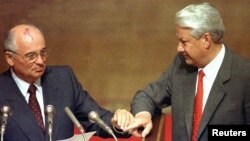Twenty-five years ago, on August 19, 1991, a hard-line group calling itself the State Committee for the State of Emergency (known by its Russian acronym GKChP) announced that it was removing the Soviet Union’s reformist president, Mikhail Gorbachev, from power and taking control of the country.
The GKChP’s goals were to halt Gorbachev’s policies aimed at liberalizing the economy and relaxing controls on freedom of expression, and to restore the centralized Soviet state.
Thousands of people took to the streets in Moscow to oppose the GKChP, and while three demonstrators were killed in a confrontation with security forces, there was no mass use of force against the protesters, and the attempted coup fell apart in a few days.
Dissolution soon followed
Still, the failed putsch further destabilized the Soviet state, which was already coming apart because of a steady loss of faith in the Soviet Union's ruling communist ideology and rising nationalism in its constituent republics. The Soviet Union was dissolved four months later on December 26, 1991.
One of the coup plotters committed suicide, while the remaining seven, along with three other officials, were put on trial starting in late 1993. All 10 were amnestied the following year.
Russia's current president, Vladimir Putin, once called the dissolution of the Soviet Union “the greatest geopolitical tragedy of the 20th century.” He has been in power for 16 years. During that time, he has rolled back many of the democratic reforms Gorbachev inaugurated three decades ago.
In a survey conducted last month, the Levada Center, Russia’s only independent national polling agency, found that 58 percent of respondents said they largely trusted Putin and 20 percent said they completely trusted him, while only 12 percent said they largely distrusted him and 6 percent said they completely distrusted him.
Assessing failed coup
In a separate Levada Center poll conducted in late July, respondents were asked to assess the failed August 1991 coup. Thirty percent of the respondents called it “a tragic event which had disastrous consequences for the country and the people,” while 35 percent called it “just an episode of power struggle in the top leadership of the country.” Only 8 percent called it “the victory of a democratic revolution that ended the power of the Communist Party,” while 27 percent said they were undecided about how to assess it.
Asked whether they would come out to protect “Russian democracy” if something like the 1991 coup attempt happened today, 16 percent of the respondents answered “yes,” 44 percent answered “no” while the rest said they didn’t know whether they would or not.
Gennady Burbulis was a close associate of Boris Yeltsin, the Russian leader who resisted the August 1991 coup attempt and became post-Soviet Russia’s first president. Burbulis told VOA’s Russian service that while the Soviet Union disintegrated nearly a quarter a century ago, an “imperial mindset” persists in Russia.
“An imperial complex has left deep roots that formed over centuries," he said. “And it hasn't gone anywhere.”
Burbulis added that Russia is also dealing with “a Soviet heritage that manifests itself in increased confrontation and violation of basic human rights, including international law.”
Speaking from Kazakhstan, Dosym Satpayev, director of the Almaty-based Risk Assessment Group, told VOA that many members of his country’s older generation are nostalgic for the Soviet period.
Younger people don't relate
"Many of the older generation regret the collapse of the Soviet Union and think it was a mistake,” he said. "As for young people — or, as they are called, the ‘generation of Independence’ — who were born after 1991, all of these events are for them approximately what the Middle Ages or even Ancient Greece are for us. That is, they do not relate to these events either positively or negatively, simply because many do not know anything about them.”
Views of the Soviet Union's collapse nearly 25 years on are much different in countries like the Baltic states, which even before 1991 had fully developed independence movements.
“Although it is assumed that the collapse occurred in December 1991, by that time, Estonia, Latvia and Lithuania had already left the Soviet empire,” Kalev Stoicescu, a researcher with the International Center for Defense Studies in Tallinn, Estonia, told VOA’s Russian service in an interview from the Estonian capital.
While the Soviet Union’s breakup “was the greatest catastrophe of the 20th century for the president of one large state,” Stoicescu said, “for me and for the vast majority of Estonians, it was the best thing that could have happened.”







